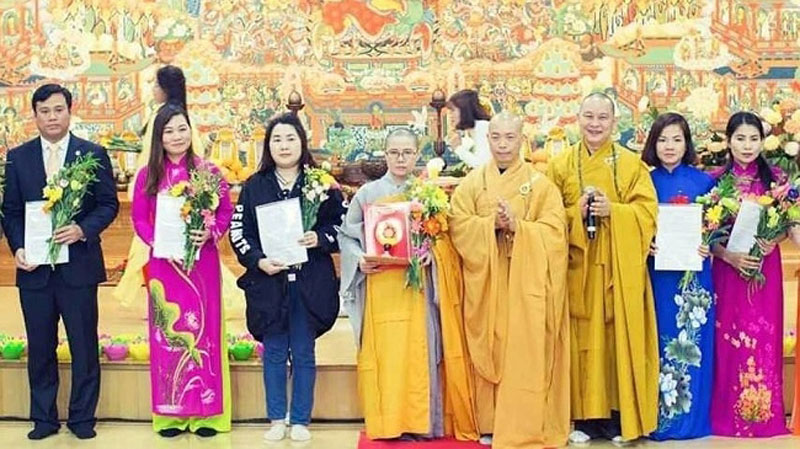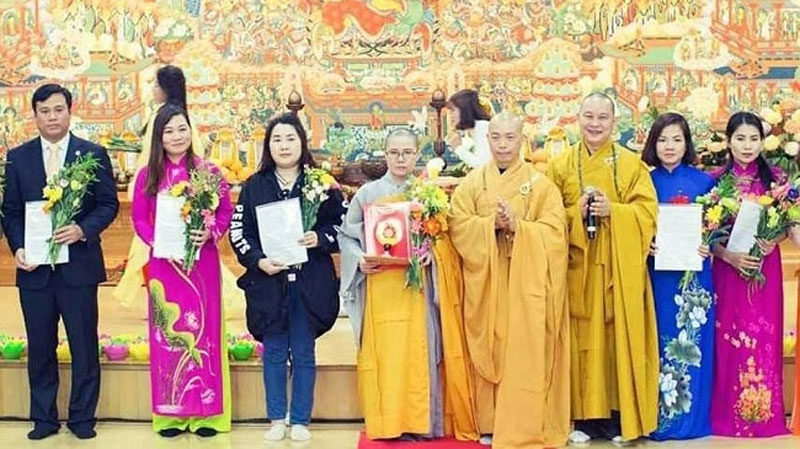
The Vietnamese Buddhist Association in the Republic of Korea (RoK) held a requiem at Phung An pagoda in Seoul, on March 11, to pray for national peace and prosperity.
Hundreds of Vietnamese Buddhist followers, including migrant
workers, students and members of Vietnam-RoK multicultural families across the
RoK, were present at the event.
Buddhist nun Thich Nu Gioi Tanh, Chairwoman of the
Vietnamese Buddhist Association in the RoK, said that the requiem aims to pay
tribute to the ancestors and soldiers who sacrificed their lives for Vietnam’s
national independence and freedom.
She highlighted the significant contributions made by the
Vietnamese Buddhist community in the RoK to charitable activities both in the
host society and the homeland.

A representative from
the Vietnam Buddhist Sangha (VBS) Central Committee announces a decision to
recognise the Vietnamese Buddhist Association in the RoK as a member of the
VBS.
At the ceremony, a representative from the Vietnam Buddhist
Sangha (VBS) Central Committee announced a decision to recognise the Vietnamese
Buddhist Association in the RoK as a member of the VBS.
The association’s chairwoman pledged to accompany other
Vietnamese associations in the RoK in order to build a strong community of
overseas Vietnamese and significantly contribute to the development of the two
countries’ relations.
Concluding the
requiem, the participants offered incense and released flower garlands to commemorate
the deceased and prayed for a New Year of peace and prosperity.
Source: NDO
With an increasingly vibrant and widespread emulation movement aimed at building cultured residential areas and cultured families, Yen Thuy District has been making steady progress toward improving both the material and spiritual well-being of its people, while fostering a civilized, prosperous, beautiful, and progressive community.
Once lacking recreational spaces and community facilities, Residential Group 2 in Quynh Lam Ward (Hoa Binh City) has recently received attention for the construction of a new, spacious, and fully equipped cultural house. The project followed the model of state support combined with public contributions in both labor and funding.
The "All people unite to build cultural life" movement, which has been effectively integrated with Kim Boi district’s socio-economic development goals, is fostering a lively spirit of emulation across local residential areas, hamlets, villages, public agencies, and enterprises. In addition, through the initiative, traditional cultural values are being preserved and promoted, while community solidarity and mutual support in poverty reduction and economic development are being strengthened.
A working delegation of the Hoa Binh provincial People’s Committee led by its Permanent Vice Chairman Nguyen Van Toan on June 11 inspected the progress of a project to build the Mo Muong Cultural Heritage Conservation Space linked to tourism services in Hop Phong commune, Cao Phong district.
Born and growing in the heroic land of Muong Dong, Dinh Thi Kieu Dung, a resident in Bo town of Kim Boi district, in her childhood was nurtured by the sweet lullabies of her grandmother and mother. These melodies deeply imprinted on her soul, becoming an inseparable part of her love for her ethnic group's culture. For over 20 years, this love for her hometown has driven Dung to research, collect, and pass down the cultural values of the Muong people to future generations.
In the final days of May, the Ethnic Art Troupe of Hoa Binh Province organized performances to serve the people in remote, mountainous, and particularly disadvantaged areas within the province. These were not just ordinary artistic shows, but they were the meaningful journeys aimed at spreading cultural values, enhancing the spiritual life of the people and contributing to the preservation of ethnic minority cultural identities.



